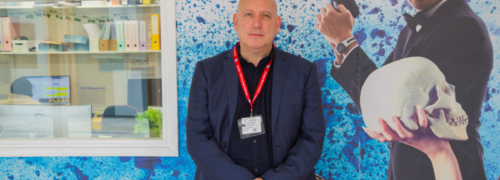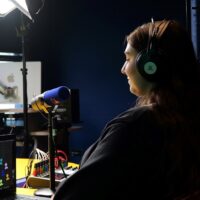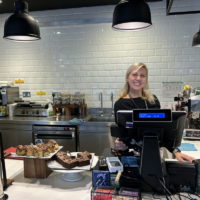
People
Meet the Dockers: James Kenworth
James Kenworth is a playwright and creative writing tutor. His work often explores themes of social justice, class, and community, with a strong focus on engaging local audiences and untold stories. James is best known for his Newham Plays series, a critically acclaimed collection of site-specific and politically engaged theatre pieces that bring to life the unique voices and experiences of the Newham borough.
James has deep roots in Newham, where he lived for nearly 30 years, and shaped his voice as a playwright. In this special Meet the Dockers interview, James shares the importance of locally made theatre and the impact and approach of the Newham Plays series, part of Royal Docks Originals, a free arts festival in the Royal Docks, running from 15 September to 4 October 2025.
Why is locally made theatre important to you, and what inspired the creation of the Newham Plays?
As the creator and writer of the Newham Plays Series, locally made theatre is a subject very close to my heart. Performed in site-sympathetic/responsive locations in East London’s Newham, featuring a hybrid of professional actors/creative team and local young talent, the Newham Plays range from radical and localised remixes of classic literature to dramatizing the borough’s rich political and cultural heritage.
How would you describe the impact and approach of the Newham Plays series on local theatre and cultural engagement?
The critically acclaimed series has originated and pioneered a decentralized, public space-fronted approach to cultural engagement, which I’ve defined as ‘Pro-Localism’, in which the plays are partnered and supported by a nexus of professional and local funders, partners and stakeholders.
Reviewing Elizabeth Fry: The Angel of the Prisons, my play about Victorian prison reformer Elizabeth Fry’s extraordinary achievements and legacy (including her humanitarian work in East Ham), London Theatre Reviews commented: “Kenworth’s production is an inspiration for theatre makers across London. The ‘Pro – localist’ ethos, combined with facilitating a local community space, could be the answer to countless fringe and off-west end theatres having to close their doors across London.”
I think there’s a ‘social reaffirmation’ argument to make here. So, inspired by the unique and adventurous work of fellow localist theatre makers elsewhere in the UK (Middle Child, An Tobar and Mull Theatre, Slung Low) here’s an unashamedly romantic shout-out for the ‘human connection’ value of localist-inspired theatre in these deeply polarised times. In an increasingly digitally saturated world, where advances in technology are negating the need for face-to-face human contact, the ‘analogue’ experience of a small group of people in a non-corporate, localised setting, watching a play, on a bare stage, or on a farm or adventure playground, with just a few props, some indicative costumes, becomes almost an act of subversion.
A ‘natural’ insurgence which suggests more than a hint of an oppositional stance towards the big-budget, lavish dramas pumped out on an alarmingly regular, if hugely popular, basis by the streaming giants. Grassroots-level theatre may survive surprisingly well in a hyper-digitised leisure/entertainment landscape, precisely because of its offer of ‘unconscious subversion’ and promise of visceral sensations; low-tech/no-tech, physical, communal-centred; a sense of touch, brushing past people, people bumping into you. The messy pleasure of being human.
With each production, the Newham Plays reaffirm the borough’s cultural identity and champion a collaborative, community-anchored vision for the arts.
It’s rare to find a festival so connected to its own neighbourhood, and I think that’s what makes Royal Docks Originals so special.
What have you found most exciting about the Royal Docks Originals Festival?
Royal Docks Originals Festival is such an exciting celebration of the area’s rich creativity, with so many powerful stories and narratives that reflect its history, communities, and future. What excited me most is seeing work that is rooted in this place whether that’s theatre, music, or visual arts and to see how local voices and histories are being reimagined through different artforms. It’s rare to find a festival so connected to its own neighbourhood, and I think that’s what makes Royal Docks Originals so special.
Sum Royal Docks Originals up in one word
Original!
Find out more:
The Newham Plays
The Newham Plays screenings are part of Compressor House Warming and Royal Docks Originals.
James Kenworth
To find out more about James Kenworth visit www.jameskenworth.co.uk


